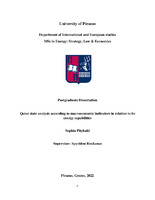Qatar state analysis according to macroeconomic indicators in relation to its energy capabilities

Master Thesis
Συγγραφέας
Πιτυκάκη, Σοφία
Pitykaki, Sophia
Ημερομηνία
2022Επιβλέπων
Ρουκανάς, ΣπυρίδωνRoukanas, Spyridon
Προβολή/
Λέξεις κλειδιά
Qatar ; Energy ; Macroeconomics ; Energy crisisΠερίληψη
With the prices rising to their highest point during the decade and its lack of diversification in
supply, EU’s energy security and availability are threatened. Meanwhile, the climate crisis
demands a sustainable solution, with energy and environmental security being two co-existing
factors.
Qatar has become a developed economy, playing an important role in the Middle East financially
and diplomatically. It is ranked among the economies with the highest GDP and the largest oil and
natural gas reserves and is also entering its RES era. The state has also built strong bonds with the
US. The European market is currently left without a main supplier, and it is possible that Qatar
will include it into its market expansion plan.
Furthermore, a state analysis takes place to reach valid conclusions about Qatar’s current financial
state as well as expectations for the foreseeable future. MENA states usually suffer from
phenomena such as resource curse that influence their reliability as main suppliers in the longterm. Qatar has not been negatively influenced so far because it has come up with effective
solutions such as its National Vision 2030 strategy.
Lastly, EU has come up with the REPowerEU plan, a strategy concerning supply diversification,
new LNG imports, climate-oriented solutions, and the required monetization. This can have a huge
short-term impact on dealing with the crisis. Qatar on the other hand is more likely to become an
effective long-term alternative for Europe, however it is highlighted that Europe should not again
over-depend on one and only supplier.


